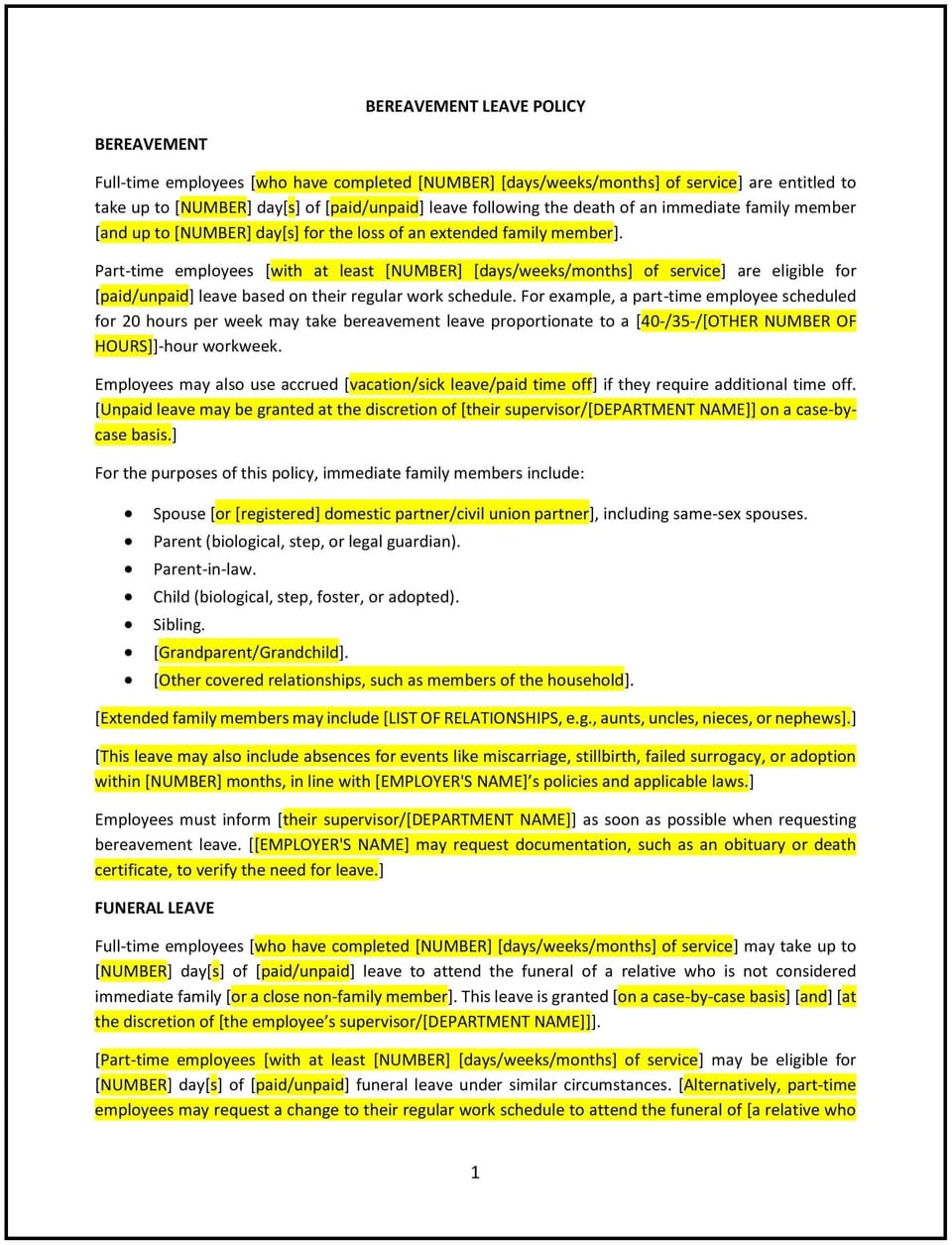Bereavement leave policy (Illinois): Free template

Bereavement leave policy (Illinois)
This bereavement leave policy is designed to help Illinois businesses provide employees with time off to grieve the loss of a loved one. It outlines eligibility, leave duration, and notification procedures, supporting compliance with the Illinois Family Bereavement Leave Act (FBLA) and promoting employee well-being.
By adopting this policy, businesses can support employees during difficult times while maintaining workplace efficiency.
How to use this bereavement leave policy (Illinois)
- Define eligibility: Specify which employees qualify for bereavement leave, such as full-time or part-time employees who meet certain service requirements.
- State covered relationships: List the family members whose loss qualifies an employee for bereavement leave, such as a spouse, child, parent, or sibling, as defined by Illinois law.
- Specify leave duration: Outline the amount of leave available, typically up to 10 working days within a 60-day period following the loss, in compliance with Illinois FBLA.
- Include notification requirements: Require employees to provide reasonable notice of their need for bereavement leave and any documentation, such as an obituary or death certificate, if requested.
- Address pay: Clarify whether bereavement leave is paid or unpaid, depending on company policy and Illinois law.
- Accommodate additional needs: Consider including flexibility for additional time off or unpaid leave for extraordinary circumstances.
- Ensure job protection: Assure employees that their job or an equivalent position will be available upon their return from bereavement leave.
- Promote sensitivity: Encourage managers to handle bereavement leave requests with empathy and discretion.
Benefits of using this bereavement leave policy (Illinois)
This policy provides several benefits for Illinois businesses:
- Supports employees: Provides time off for grieving employees to attend services, handle arrangements, and cope with their loss.
- Promotes compliance: Aligns with Illinois FBLA to reduce the risk of legal disputes and liabilities.
- Enhances workplace morale: Demonstrates the company’s commitment to supporting employees during challenging times.
- Ensures consistency: Establishes clear and consistent guidelines for handling bereavement leave requests.
- Reduces workplace disruptions: Provides a framework for managing absences while maintaining operational efficiency.
Tips for using this bereavement leave policy (Illinois)
- Communicate the policy: Share the policy with employees during onboarding and include it in the employee handbook.
- Train managers: Provide guidance on handling bereavement leave requests with sensitivity and in compliance with Illinois law.
- Monitor compliance: Ensure that leave requests and approvals are consistent with this policy and applicable laws.
- Be flexible: Consider accommodating additional time off for unique situations, such as traveling for services or handling estate matters.
- Update regularly: Revise the policy as needed to reflect changes in Illinois FBLA, company practices, or employee needs.
Q: Who is eligible for bereavement leave under this policy?
A: Eligible employees include those who meet the company’s service requirements and have experienced the loss of a covered family member, as defined by Illinois law.
Q: What family relationships are covered under this policy?
A: Covered relationships include a spouse, child, parent, sibling, grandparent, or other family members specified by Illinois FBLA.
Q: How much bereavement leave is provided?
A: Employees are typically entitled to up to 10 working days of bereavement leave within a 60-day period following the loss, as outlined in this policy.
Q: Is bereavement leave paid or unpaid?
A: Whether bereavement leave is paid or unpaid depends on company policy and Illinois FBLA requirements. Specific details are outlined in this policy.
Q: What documentation is required for bereavement leave?
A: Employees may be asked to provide reasonable documentation, such as an obituary, funeral program, or death certificate, to support their leave request.
Q: How should employees notify the company about their need for bereavement leave?
A: Employees should notify their manager or HR as soon as possible, providing the required documentation if requested.
Q: Does this policy allow additional time off for bereavement?
A: Additional time off may be provided at the company’s discretion, depending on individual circumstances and company policy.
Q: How often is this policy reviewed?
A: This policy is reviewed annually or whenever significant changes occur in Illinois laws or workplace practices.
This article contains general legal information and does not contain legal advice. Cobrief is not a law firm or a substitute for an attorney or law firm. The law is complex and changes often. For legal advice, please ask a lawyer.


